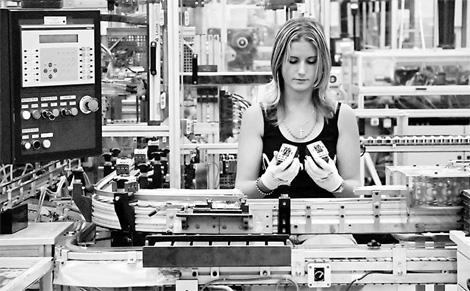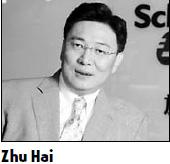 A production line employee checks electric contactors at the Schneider Electric factory in Le Vaudreuil, France. Zhu Hai, newly appointed Schneider Electric's first native president in China, does not believe that he will face a series of big challenges at his new job. [Agencies]
A production line employee checks electric contactors at the Schneider Electric factory in Le Vaudreuil, France. Zhu Hai, newly appointed Schneider Electric's first native president in China, does not believe that he will face a series of big challenges at his new job. [Agencies]
Zhu Hai is Schneider Electric's first native-born president of its China operations, but he believes it will be business as usual.
"Schneider Electric SA has been well on track since it entered China in 1987. And especially in recent years, our company has been maintaining double-digit organic growth in the market," Zhu said.
After taking the reigns from his French predecessor in September, Zhu became responsible for the Paris-based company's 15,000 employees, 77 offices, 22 factories, six distribution centers, one learning institute, two research and development centers, one laboratory, 500 distributors and a nationwide sales network.
From 2005 through 2008, Schneider Electric grew its business in China by about 10 percent each year - well ahead of the business growth of most companies in the sector.
China is the company's second-largest market behind the United States. "We expect China to be the top one in the near future," Zhu said.
Growing market
Realizing the China market's significance, the company has announced plans to move its Asia-Pacific headquarters to Beijing next year.
"I, a native-born president, have the responsibility of being a bridge between Schneider Electric and the Chinese government, as well as our local customers," Zhu said.
Zhu was directly involved in Schneider Electric's strategic partnership with China's Delixi Group to form a low-voltage product joint venture in Wenzhou, Zhejiang province, in late 2006. At the time, it was the biggest by scale and investment in China's power industry.
When the joint venture was inaugurated in 2007, Zhu became chair of Delixi Electric Ltd and helped it become successful.
"I achieved my target of 'Six Satisfactions', making our staff, providers, distributors, shareholders, local governments and customers satisfied with the Delixi venture's business here," Zhu said.
"Now I am making efforts to bring my Six Satisfactions concept into Schneider Electric's company culture," he added.
Long-term strategy

Schneider Electric during the past few years began to transfer itself from a products provider to a worldwide products and solutions provider. China is not an exception.
"So my strategy is to help my company implement and accomplish the transition, especially during the financial crisis," he said.
Zhu told China Business Weekly that Schneider Electric sees a huge potential for providing power control and management services in emerging markets like China.
According to the company's financial report for the third quarter, its revenues declined 17 percent worldwide over the last year. The company cited the global financial crisis for shrinking revenues.
However, Schneider Electric's revenues in the Asia-Pacific region, led by its China operations, fell by only 5 percent - a much better showing than the 20 percent drop in revenues in Europe and North America.
"From a long-term perspective, to further develop in China's market, we will focus our business on three segments," Zhu said.
First, Schneider Electric will actively "participate in the Chinese government's initiative of energy conservation and emission reduction through cooperation with related government offices and also enterprise partners", he said.
"Schneider Electric helped Beijing Yanshan Petrochemical Co Ltd, under Sinopec, one of China's larger chemical product producers, to save electricity costs of 450,000 yuan ($65,908) per year with our tailored energy use and management solution," he said.
Schneider Electric also helped reduce carbon dioxide emissions by 700 tons.
"On average, our customers can get back their investment through saving energy costs within three years," Zhu said.
"It's more than a win-win situation for us and our customers. The cooperation also benefits society by reducing emissions," he said.
Second, he said, Schneider Electric provides low- and medium-voltage power distribution solutions and network monitoring systems to China's energy Smart Grid.
"We are very dedicated to this field of power distribution and usage, since we neither generate electricity nor produce power consumption equipment," Zhu said.
The third focus is to improve the safety of power resources and the living standard of the Chinese people.
In the 1980s, Schneider brought safer circuit breaker technology to China, replacing traditional fuses.
"Although China's-big and medium-sized cities have said goodbye to the application of fuses, we still see huge potential for the safer use of power in China's vast rural regions," Zhu said.
"There are few companies like us that can provide such comprehensive power management solutions in more than 20 industries," Zhu said.





